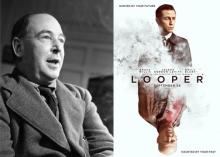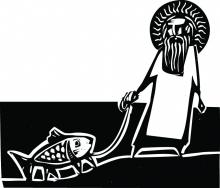Theology

There is a line from a Gerard Manley Hopkins poem about the Virgin Mary that describes the baby Jesus as “God’s infinity, dwindled to infancy.” The line captures perfectly the beautiful but also shocking idea, central to Christianity, that the infinite God who created the universe also chose to descend, dwindle, become small, become helpless, become dependent on human beings.
Hopkins is right: the baby Jesus is not merely a sentimental or cute idea but is potentially radical, transformative, and controversial.

As the credits rolled after Looper in a packed Chinatown movie theater in Washington, D.C., I simply sat in reverent silence. Moviegoers on all sides began to rise and quietly leave the theater, but for a brief moment all I could do was just sit there. Quite simply, the movie blew my mind.
When I snapped out of it my thoughts started racing, analyzing the ending, which I won’t ruin for you, and the movie as a whole. It wasn’t a question of whether it was “good” or captivating — those were givens. Rather, I started mining the film’s rich themes and questions, particularly what it said about love.
While sitting there, lost in my mind, I began to notice the music accompanying the names moving onscreen. The song’s chorus sang something like, “I loved you so much that it’s wrong.”
I don’t think the song choice was an accident.
That lyric, I think, illuminates the crux of the film: can something like “Love” — not just romantic love — become perverted? Or, in other words, can our love for one person lead us to do horrible things to others?
In the aftermath of Superstorm Sandy, thoughts on natural disasters, the divine, and 'why bad things happen to good people.'

What is it that music actually does? What is that thing? I'm not entirely sure.
That music has physical qualities is unquestionable. A certain pitch can shatter glass. Low notes can cause the trunk of the car stopped next to you in traffic to shimmy and shake. Volume hurts our ears. Music, temporally bound, is material.
It affects the world around us. It engages the world around us. Sound waves travel through various substances...with greater or lesser ease depending on the substance, but it does travel. It moves.
But does it live, move, and have being?
Cosmic Christ – depth of reality. The resurrection of Christ is also of the body…exit wounds and all. So can the music that changes the shape of the world we live in not help us access the God who inhabits the world and heaven at the same time?
So often I read passages like the one above from Rock and Theology (an amazing blog, by the way) and I wonder what the hell we're all going on about. Music does not have agency in any conscious sense. It is substantive, of course, and could be analysed liturgically like any other liturgical object.
Editor's Note: Theologian extraordinnaire Tripp Hudgins put together this edition of First Thoughts on living with abundance, butting up against living with anxiety.

In a world that seems completely and irrevocably divorced from the teachings of Christ, where in contemporary society is there a place for the Christian voice? Politicians shamelessly use Jesus’s name to justify their authority and gain influence without bothering to unpack the full depth of theological and ethical implications of their words. Corporations are granted the rights of individuals, but some individuals are denied the resources they need in times of crisis to support their families and livelihoods. And the public debate is so full of vitriol and hyperbole that dehumanization and outright hatred of those with whom we disagree has become the norm. In light of the situation in which we find ourselves, how then should Christians behave?
While it might seem appealing to remove ourselves from secular society altogether and forsake the world in all its brokenness in favor of a uniquely Christian ethic that appeals and applies only to us, Christians have an obligation to serve as active participants in public discourse— elevating the conversation rather than abstaining from it so that we may try to live the truth and convictions of our faith.

The Christian Community Development Association (CCDA) has been a powerful force for Christian social action over the past decade. CCDA's leadership development, resources, and vision have been powerfully focused on helping pastors and community leaders facilitate the restoration of communities all over the country and around the world.
Born out of the traditions of the civil rights movement, CCDA is now engaging a new generation of pastors, prophets, and ministers. This next generation of CCDA will naturally look somewhat different from previous generations as they respond to the ever-changing landscape of our society. As it turns out, one major difference is a hunger among leaders for a more robust and powerful theological foundation from which to pursue ministry.
Practics has long dominated the field of Christian social action. What works? What strategies and techniques will actually bring about change in our community? These have been the central questions of past generations. However, among a new generation of church and community leaders, practical questions are not the sole concern, and in some cases not even the primary concern.

I was invited to appear on a Detroit radio show this past week called Christ and the City, hosted by Christopher Brooks. It’s a right-leaning talk show with an evangelical focus, but I was energized and encouraged by the conversation because it was respectful and substantive. We didn’t see eye to eye on much (as you’ll hear), but we made space for the differences, trusting that listeners would reflect on the broadened perspective, with the hope of being enriched in the process.
The premise of the interview was a discussion of my book, Banned Questions About the Bible, but you’ll soon realize as you listen that we got into all sorts of other interesting topics, such as salvation, interpretation of scripture and the difference between “Truth” and “Fact” in the Bible.

Mitt Romney angered evangelicals during his first White House run in 2008 by blurring the theological lines between their faith and his Mormonism. Lurching in the other direction, he irked them again by scarcely mentioning religion at all during this year’s GOP primaries.
But Romney has finally found some middle ground, evangelical leaders say, by sidelining theology and stressing the “Judeo-Christian values” that he shares with social conservatives.
“He’s made it very clear not to gloss over the theological differences that his faith has with evangelicals,” said Tony Perkins, president of the conservative Family Research Council in Washington. “As long as he talks about the shared values of our religious traditions, I think he’s good.”
Romney did exactly that during a Sept. 9 Meet the Press interview, saying that religion inspired him to run for president — without mentioning the word “Mormon.”
“The Judeo-Christian ethics that I was brought up with -- the sense of obligation to one’s fellow man, an absolute conviction that we are all sons and daughters of the same God and therefore in a human family — is one of the reasons I am doing what I’m doing,” he said.
Conservative Christian leaders are taking the same approach, urging evangelicals to focus on Romney’s policies and principles, not the particulars of his faith.

What if music were ethics?
You know, the art of listening and producing sounds as ethics?
I'm just thinking on the old blog here. I'm preaching next Sunday and I'm thinking about listening and music and how we learn to be good to one another. Somewhere someone wrote "It is better to give than receive."

Most of us know what physics is, but what in the world is metaphysics? One might first recall Meta World Peace, who currently plays for the Lakers. So, metaphysics is just another one of those guys who adopted some sort of weird name, right?
Wrong.
According to John Cobb, a theologian who played a crucial role in the development of process theology, metaphysics asks, "what is it in and of itself that constitutes what is truly real and actual"? In physics you don't quite get to that. Metaphysics deals with ousia, which is substance in Greek. The world is made up of substances and the questions of metaphysics are to understand what substances are.
Woah. That sounds intense.
You can hear more and hopefully understand a little more (via the "substance" of your brain) HERE, as Cobb talks theology during the Emergent Village Theological Conversation at Claremont School of Theology in California.
As the radio emcee at Homebrewed Christianity describes it, "It's time to nerd out with your geek out."

More than two dozen Christian conservatives are trying to put theological debates about presidential candidate Mitt Romney's Mormonism to rest by focusing on the policies outlined in the GOP's new national platform.
In a letter delivered Sept. 7 to Romney the leaders acknowledged that some conservatives have “tempered their enthusiasm for sound governing principles by their concern over differences in a candidate’s theological doctrine.”
But, the leaders said, "it is time to remind ourselves that civil government is not about a particular theology but rather about public policy."
Signatories of the letter include the two sons of the late Jerry Falwell, leading Catholic anti-abortion activist Rev. Frank Pavone, and GOP strategist Ralph Reed. Polls repeatedly show that, while most social conservatives favor Romney, nearly a quarter still express discomfort with his Mormon faith.

Tony Jones has asked some of us progressive Theobloggers to chime in on God, you know, perhaps some kind of definition or doctrine (that word many of us progressives despise). You can read his invitation here. Tony doesn't want us to talk about Jesus, per se, but about God. I get that. He's in his evangelical context and he gets tired of all the Jesus talk. Lately it seems that the Emergent conversation has been all Jesus all the time. Now, that doesn't bother me, but then again I feel that in my end of the progressive mainline (free church progressive) we don't talk about Jesus enough. We talk about God all the time. Jesus, well, he's a bit of an enigma. What else is there to say? Nevertheless, Tony's invitation is an interesting one and I'm willing to chime in.
One caveat: I'm doing this as a way to speak of one Person of a Trinity. To speak of the One is, in many ways, to speak of the Three and the Unity. But this is just a blog post and not a 20-page essay. So ... yeah.
My answer: If you want to know God, get Religion. (Have you got good religion? Certainly, Lord!) Religion is a combined set of activities embodied by people. These activities are not limited to but may include the following behaviors: liturgy, charity, politics, and even theology (mystical and systematic), and doctrine. Religion can be communal or individual. Religion is the principal craft by which we know (cognition) and understand (hermeneutics) God.

In a recent post here on God's Politics, Derek Flood suggested (as many have lately) that Christian communities need to start taking this whole "faith and science" thing seriously.
I posted some relatively snarky comment on my Facebook page about it (I apologize for the snark) suggesting that the authors of these recent posts about faith and science are ignoring about a century's worth of conversation and theology. Perhaps more.
Let me give you an example of what I mean in Harry Emerson Fosdick.***
As I said just yesterday, Fosdick was famous for lots of things, particularly the sermon "Shall The Fundamentalists Win?" which he preached on May 21, 1922.
It was a call to arms of sorts within the church, encouraging tolerance and a willingness to engage the minds of believers and unbelievers alike in a time of incredible scientific discovery.

Biting and unbelieving comedian Bill Hicks challenged Christians about wearing crosses around our necks. He chided us that when Jesus comes back, the last thing he would want to see is another cross. Not unlike Hicks, liberal theologians get squeamish about the saving power of the cross and distance themselves from it with critiques that attack academic euphemisms like blood atonement.
My friend, colleague, and our “religion and culture” book-discussion leader assigned our Sunday school class homework this week: Consider and contemplate our understanding of and relationship with the cross. And do this in the context of a compelling and challenging chapter called “The Cross as Futility, Not Forgiveness” in an excellent and provocative book we’re reading by Robin Meyers called Saving Jesus From The Church: How to Stop Worshiping Christ and Start Following Jesus. This post serves as part of my response to that homework.
Crosses as powerful symbols predate Christianity and are not the singular insignia of our faith. Some Christians prefer the fish to the cross as an identity marker for Jesus followers. I confess I simultaneously love the empty cross and accept brutality of the bloody crucifix. As contradictory and ubiquitous its grip on our consciousness, we cling to it in comfort. As theologically problematic as we might render its salvific power, we sing of “the rugged cross” and need “nothing but the blood.”
From my enormous sympathies for Meyer’s intentions and investigations, I’m ultimately left lingering with discontent at his conclusions. I easily devoured Saving Jesus, and alongside my mixed reactions to the text, our class discussions have helped me to wrestle with not just my responses to the book in particular but to clarify my faith and theology more generally.
Our friends at #OccupyTheology caught up with Sojourners CEO Jim Wallis, Brian McLaren, Sojourners' Director of Mobilizing Lisa Sharon Harper and others at the Wild Goose Festival to talk about the Occupy movement, faith, politics and culture in a series of engaging videos.

Colorado Springs really must have angered God.
I’m not sure what the city's residents have done, but He has to have a reason for burning up homes and possessions. One thing we know: God sends messages through natural disasters to certain groups who defy him and peddle evil. How else could we explain what’s happening?
Mark 4 tells us that Jesus controls the wind. And it is the wind, in large part, that has caused the fire to spread. Perhaps we should heed the warning of Jesus in Luke 13 and repent or else face the reality of perishing like them.
Is it possible that groups such as Compassion International and Bibles for the World have secretly condoned certain sins that will, in the end, keep people out of the kingdom of God? What message is God sending to groups like HCJB Global and Biblica?
This fire seems to be warning to them, and everyone to repent. They need to step up and reaffirm the Evangelical tradition. They must turn back from distorting whatever it is they have distorted about God’s character.
Does this sound ridiculous?

For me, intellectual exploration was one of the primary ways I connect with God. My writing, teaching, and graduate studies have not come out of a desire to attain a “deeper” faith, but rather out of a unique conviction that I must pursue these things out of faithfulness to the faith I ascribe to. God has created me for this stuff and it is a significant way I hope to edify the Church global.
Now, while this is an important reality to acknowledge and foster as I come to better understand my wiring and its relation to my Kingdom contribution, I have to hold this reality in tension with some recent experiences and convictions that have come about as a result.

ATHENS, Ala. — Black and white. Heaven and hell. Right and wrong.
Blur or question those lines, and, well, all hell can break out.
At least it did for Edward Fudge in the early 1980s in in this small northern Alabama hamlet.
Fudge was a young preacher who also worked in his father's publishing company. When he began to teach a doctrine of hell that contradicted the traditional view of a place of eternal fiery torment for the damned, a quick succession of events cost him his job and his pulpit.
A new film, Hell and Mr. Fudge, compresses the events of the years when Fudge, now a Houston-based lawyer and internationally known Bible teacher and author, began an intensive study of the Bible and the doctrine of hell. What he found made him question one of the bedrock doctrines of Christianity.

It seems that America is on the verge of a zombie apocalypse.
First, Ronald Poppo had most of his face eaten off by Rudy Eugene, and now, Alexander Kinyua reportedly killed his roommate, Kujoe Bonsafo Agyei-Kodie and then ate his heart and part of his brain.
Is it just coincidence that this spate of violent attacks comes when the county’s fascination with zombies is at its height, or is there a connection?
From movies to video games, Zombies are the big ticket these days. The undead top the media charts, gnawing and clawing their way into the forefront of our imaginations. Move over vampires; Zombies are the new black.
It’s hard to say if the pop culture popularity has influenced similar copycat killers, or if the zombie craze simply has made us more sensitive to similar real-life stories. Either way, both the fictional tales and actual news items may speak to something going on in our collective imaginations.